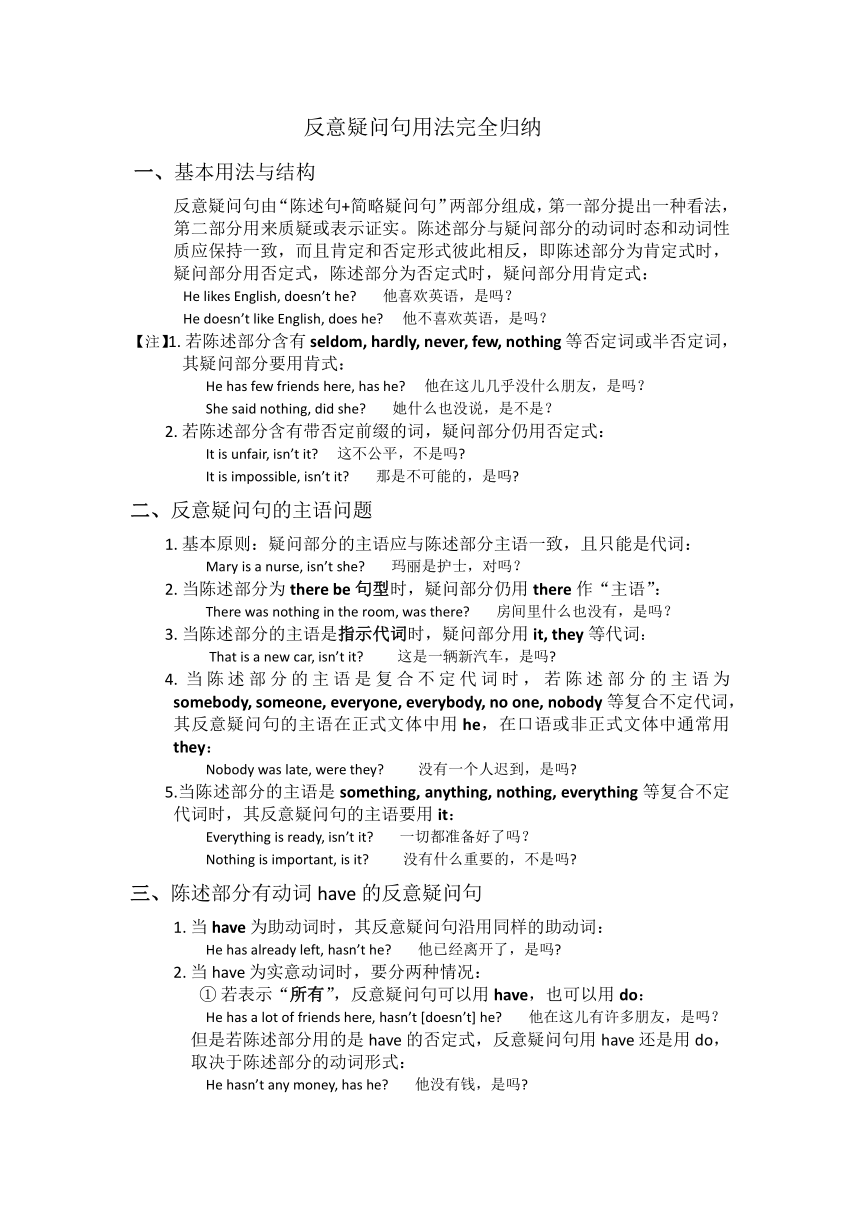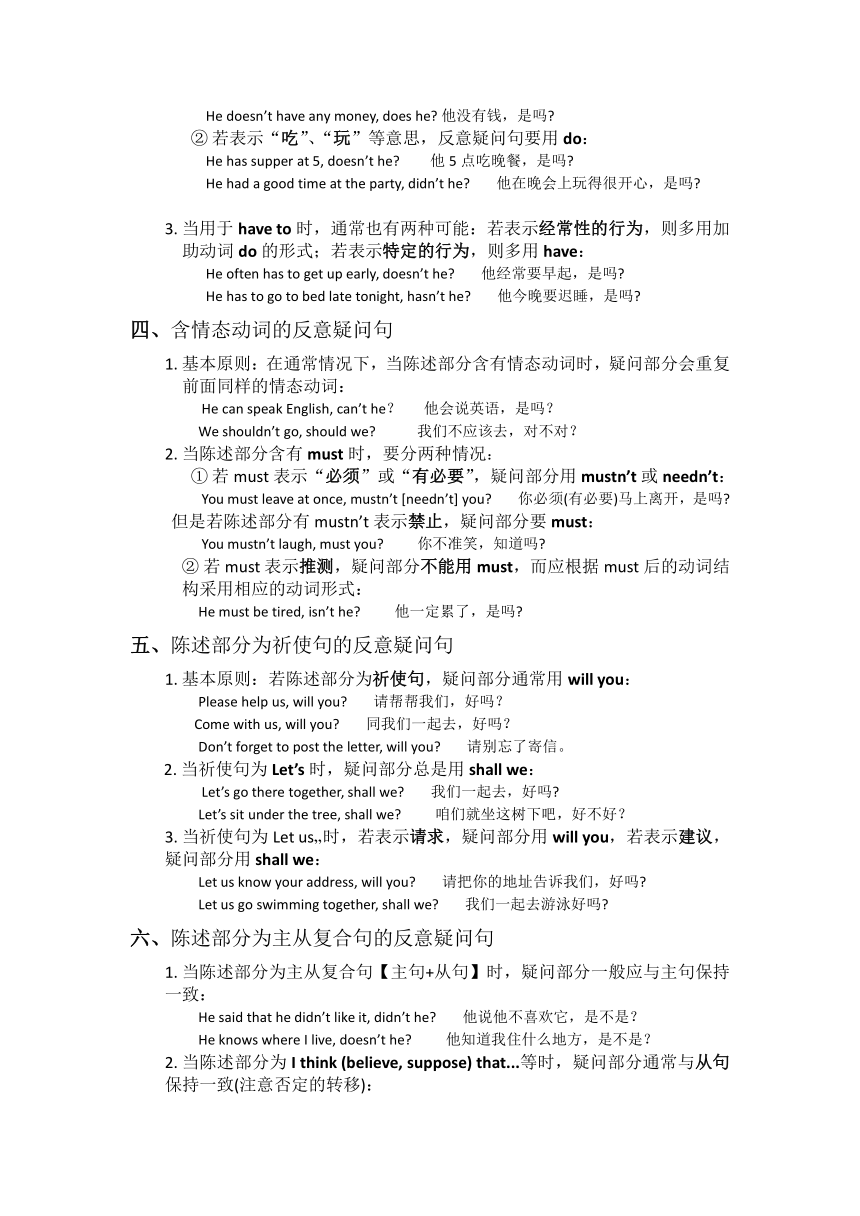初中英语-反义疑问句用法归纳 (含答案)
文档属性
| 名称 | 初中英语-反义疑问句用法归纳 (含答案) |

|
|
| 格式 | zip | ||
| 文件大小 | 27.1KB | ||
| 资源类型 | 教案 | ||
| 版本资源 | 通用版 | ||
| 科目 | 英语 | ||
| 更新时间 | 2020-12-02 22:44:33 | ||
图片预览


文档简介
反意疑问句用法完全归纳?
?一、基本用法与结构?
反意疑问句由“陈述句+简略疑问句”两部分组成,第一部分提出一种看法,第二部分用来质疑或表示证实。陈述部分与疑问部分的动词时态和动词性质应保持一致,而且肯定和否定形式彼此相反,即陈述部分为肯定式时,疑问部分用否定式,陈述部分为否定式时,疑问部分用肯定式:?
He?likes?English,?doesn’t?he??
他喜欢英语,是吗??
He?doesn’t?like?English,?does?he?
?他不喜欢英语,是吗??
【注】1.?若陈述部分含有seldom,?hardly,?never,?few,?nothing等否定词或半否定词,
其疑问部分要用肯式:?
He?has?few?friends?here,?has?he??
他在这儿几乎没什么朋友,是吗??
She?said?nothing,?did?she??
她什么也没说,是不是??
2.?若陈述部分含有带否定前缀的词,疑问部分仍用否定式:?
It?is?unfair,?isn’t?it??
这不公平,不是吗?
It?is?impossible,?isn’t?it??
那是不可能的,是吗?
二、反意疑问句的主语问题?
1.?基本原则:疑问部分的主语应与陈述部分主语一致,且只能是代词:?
Mary?is?a?nurse,?isn’t
she?
?
玛丽是护士,对吗??
2.?当陈述部分为there?be句型时,疑问部分仍用there作“主语”:?
There?was?nothing?in?the?room,?was?there??
房间里什么也没有,是吗??
3.?当陈述部分的主语是指示代词时,疑问部分用it,?they等代词:
?
That?is?a?new?car,?isn’t?it??
这是一辆新汽车,是吗??
4.?当陈述部分的主语是复合不定代词时,若陈述部分的主语为somebody,?someone,?everyone,?everybody,?no?one,?nobody等复合不定代词,其反意疑问句的主语在正式文体中用he,在口语或非正式文体中通常用they:?
Nobody?was?late,?were?they??
没有一个人迟到,是吗??
5.当陈述部分的主语是?something,?anything,?nothing,?everything等复合不定代词时,其反意疑问句的主语要用it:?
Everything?is?ready,?isn’t?it?
?一切都准备好了吗??
Nothing?is?important,?is?it??
没有什么重要的,不是吗??
三、陈述部分有动词have的反意疑问句?
1.?当?have?为助动词时,其反意疑问句沿用同样的助动词:?
He?has?already?left,?hasn’t?he??
他已经离开了,是吗??
2.?当?have?为实意动词时,要分两种情况:?
①?若表示“所有”,反意疑问句可以用have,也可以用do:?
He?has?a?lot?of?friends?here,?hasn’t?[doesn’t]?he??
他在这儿有许多朋友,是吗??
但是若陈述部分用的是have的否定式,反意疑问句用have?还是用do,取决于陈述部分的动词形式:?
He?hasn’t?any?money,?has?he??
他没有钱,是吗??
He?doesn’t?have?any?money,?does?he??他没有钱,是吗?
②?若表示“吃”、“玩”等意思,反意疑问句要用do:?
He?has?supper?at?5,?doesn’t?he?
他5点吃晚餐,是吗??
He?had?a?good?time?at?the?party,?didn’t?he??
他在晚会上玩得很开心,是吗??
?
3.?当用于have?to时,通常也有两种可能:若表示经常性的行为,则多用加助动词do的形式;若表示特定的行为,则多用have:?
He?often?has?to?get?up?early,?doesn’t?he??
他经常要早起,是吗??
He?has?to?go?to?bed?late?tonight,?hasn’t?he??
他今晚要迟睡,是吗??
四、含情态动词的反意疑问句?
1.?基本原则:在通常情况下,当陈述部分含有情态动词时,疑问部分会重复前面同样的情态动词:
?
He?can?speak?English,?can’t?he?
他会说英语,是吗??
We?shouldn’t?go,?should?we??
我们不应该去,对不对?
2.?当陈述部分含有must时,要分两种情况:?
①?若must表示“必须”或“有必要”,疑问部分用?mustn’t?或needn’t:
?
You?must?leave?at?once,?mustn’t?[needn’t]?you??
你必须(有必要)马上离开,是吗?
?
但是若陈述部分有mustn’t表示禁止,疑问部分要must:
?
You?mustn’t?laugh,?must?you??
你不准笑,知道吗??
②?若must表示推测,疑问部分不能用must,而应根据must后的动词结构采用相应的动词形式:?
He?must?be?tired,?isn’t?he??
他一定累了,是吗??
五、陈述部分为祈使句的反意疑问句?
1.?基本原则:若陈述部分为祈使句,疑问部分通常用will?you:?
Please?help?us,?will?you??
请帮帮我们,好吗?
?
Come?with?us,?will?you??
同我们一起去,好吗??
Don’t?forget?to?post?the?letter,?will?you??
请别忘了寄信。
?
2.?当祈使句为Let’s时,疑问部分总是用?shall?we:
?
Let’s?go?there?together,?shall?we?
?我们一起去,好吗??
Let’s?sit?under?the?tree,?shall?we?
?咱们就坐这树下吧,好不好??
3.?当祈使句为Let?us?时,若表示请求,疑问部分用will?you,若表示建议,疑问部分用?shall?we:?
Let?us?know?your?address,?will?you?
?请把你的地址告诉我们,好吗??
Let?us?go?swimming?together,?shall?we??
我们一起去游泳好吗??
六、陈述部分为主从复合句的反意疑问句?
1.?当陈述部分为主从复合句【主句+从句】时,疑问部分一般应与主句保持一致:?
He?said?that?he?didn’t?like?it,?didn’t?he??
他说他不喜欢它,是不是??
He?knows?where?I?live,?doesn’t?he??
他知道我住什么地方,是不是??
2.?当陈述部分为I?think?(believe,?suppose)?that...等时,疑问部分通常与从句保持一致(注意否定的转移):
I?think?that?it?is?too?short,?isn’t?it??
我认为它太短了,对不对(它太短吗)??
I?don’t?think?he?will?come,?will?he??
我认为他不会来,对吗(他会来吗)??
【注】这类用法主要限于主语为第一人称且think等动词为一般现在时的情形。??
七、反意疑问句其他几种用法??
1.?当陈述部分是I’m时,疑问部分通常用aren’t?:?
I’m?wrong,?aren’t???
我错了,是吗
I’m?older?than?you,?aren’t??
?我年纪比你大,对不对??
2.?当陈述部分是I?wish…时,疑问部分通常用may?I?
I?wish?to?go?with?them,?may?I??
我想同他们一起去,可以吗??
3.?当陈述部分有had?better时,疑问部分用had:?
He’d?better?leave?here,?hadn’t?he??
他最好离开这儿,是吗??
4.?含有ought?to?的反意疑问句,陈述部分是肯定的,疑问部分用shouldn't?/?oughtn't?+主语。?
??
He?ought?to?know?what?to?do,?oughtn't?he??/?shouldn't?he??
他应该知道怎么做,不是吗?
5.?陈述部分的谓语是used?to?时,疑问部分用didn't?+主语或?usedn't?+主语。?
?
?He?used?to?take?pictures?there,?didn't?he??/?usedn't?he??
6.?陈述部分有would?rather?+v.,疑问部分多用?wouldn't?+主语。?
??
He?would?rather?read?it?ten?times?than?recite?it,?wouldn't?he??
7.?陈述部分有You'd?like?to?+v.?疑问部分用wouldn't?+主语。?
?
?You'd?like?to?go?with?me,?wouldn't?you??
?
8?.?感叹句中,疑问部分用be?+主语。?
??
What?colours,?aren't?they??
??
What?a?smell,?isn't?it??
9.?陈述部分由neither??nor,?either…?or?连接的并列主语时,疑问部分根据其实际逻辑意义而定。?
Neither?you?nor?I?am?engineer,?are?we??
?
10.并列复合句疑问部分,谓语动词根据邻近从句的谓语而定。??
?Mr.?Smith?had?been?to?Beijing?for?several?times,?he?should?have?been?in?China?now,
?shouldn't?he??
11.带情态动词dare或need的反意疑问句,疑问部分常用?need?(dare?)?+主语。?
??
We?need?not?do?it?again,?need?we???
??
He?dare?not?say?so,?dare?you???
??
当dare,?need?为实义动词时,疑问部分用助动词do?+?主语。??
?
She?doesn't?dare?to?go?home?alone,?does?she???
12.?当陈述部分以one不定代词做主语时,附加问句的主语在正式常场用one,非正式场合用he。?
One?should?learn?from?others,?shouldn’t?one?/?he??
One?can’t?be?one’s?own?master,?can?one??
One?can?not?be?too?careful,?can?one???
13.?当陈述部分是I’m?sure?that,;we?are?sure;I’m?afraid?that;We?are?sure?that;I?feel?sure?that?等后面跟宾语从句时,反意疑问句与后面的宾语从句一致。??
14.?当陈述句的主语为each时,?反意疑问句的主语用he。?
?
Each?has?his?strong?points,?hasn’t?he?/?doesn’t?he?
15.?当陈述句的主语为each?of?us,?each?of?you,?each?of?them时,?反意疑问句的主语用we,?you,?they。?
??
Each?of?us?has?been?here,?haven’t?we??
Each?of?them?has?an?English?dictionary,?haven’t?they???
16.当陈述句的主语为each?of?…?结构时,反意疑问句的主语用he?,she,?it?强调个体,?用we,?you,?they?强调全体。?
?
Each?of?these?novels?is?to?be?discussed?this?term,?isn’t?it??
Each?of?us?have?got?the?prize,?haven’t?we??
17.?陈述句主语为such时,反意疑问句的主语单数用it,复数用they。??
??
Such?is?his?trick,?isn’t?it???
Such?are?your?excuses,?aren’t?they???
18.?在"none?of…"结构中,如of?后的名词或代词是单数,后面的主语也为单数,这种情况,主要由于of?后的名词或代词为不可数名词.?
?
None?of?it?is?here,?is?it??
19.?当陈述句部分是there?used?to?be…结构时,?反意疑问句用?wasn’t?(weren’t)?there。?
There?used?to?be?three?pine?trees?in?the?yard,?weren’t?there???
There?used?to?be?shop?at?the?corner?of?the?street,?wasn’t?there????
?
?
?
?
习题
一、构成形式:“肯定的陈述部分+否定的附加疑问句“或”否定的陈述部分+肯定的附加疑问句”?
1.?She?is?a?singer,______??(2005年重庆)????
?A.?doesn’t?she?????B.?hasn’t?she?????C.?isn’t?she?
2.(改为反意疑问句)Melissa?got?a?birthday?present.?(2005年四川)?????
Melissa?got?a?birthday?present,?______?______??????
答案:1.?C??2.?Didn’t?she?
?二、反意疑问句的答语:回答若为肯定句则前为“Yes”,若为否定句则前用“No”。如果前边的陈述句为否定句,其回答应“实事求是”???
??
1.?—?Cats?are?as?big?as?tigers,?aren’t?they??????—?___________.?(2005年江苏南通)?
???
?A.?Yes,?they?are???????B.?No?they?aren’t?????C.?Yes,?they?aren’t?????D.?No,?they?are?
????2.?—?You?will?go?swimming?this?Saturday,won’t?you??
—?__________.?I?have?to?work?this?Saturday.?(2005年四川省)????
?A.?Yes,?I?will????B.?Yes,?I?won’t?????C.?No,?I?won’t?????
答案:?B
?C??
??
三.陈述句中如有否定词hardly,?never,?few,?little,?no,?nobody,?nowhere,?nothing等时,附加疑问句要用肯定形式?
????1.(变反意疑问句).There?is?little?milk?in?the?bottle.?
?
????
There?is?little?milk?in?the?bottle,?________?_______??
????2.(改为反意疑问句)The?old?man?can?hardly?dress?himself.?
?
???
?The?old?man?can?hardly?dress?himself,?_______?_______???
????3.?(改为反意疑问句)Jim’s?never?come?to?school?late,?_______?_______?
4.?(改为反意疑问句)Miss?King?hardly?spoke?a?word?the?whole?time.?
Miss?king?hardly?spoke?a?word?the?whole?time,?_______?________???????
答案:1.?is?there?2.?can?he??3.?has?he??4.?did?she?
四、陈述句中如有have时,须注意have若是实义动词,附加疑问句可用have形式,也可用do形式;当陈述句中的have是助动词时,附加疑问句要用do的适当形式????
?1.?(改为反意疑问句)Bruce’s?just?come?back?from?England.?
?
Bruce’s?just?come?back?from?England,_______?________???????
2.?His?sister?had?a?bad?cough,______?she??
???
?
?A.?wasn’t????B.?doesn’t?C.?hadn’t???????D.?didn’t?????
答案:1.?Hasn’t?he????2.?D??
五、陈述句是there?be句型时,附加疑问句的主语用there?
There?is?some?water?in?the?bottle,isn’t___________?
?????A.?there????B.?it????C.?that?????答案:A?
六、陈述句如果是祈使句,附加疑问句常用will?you或won’t?you等使语气变得委婉。但以let's?开头的祈使句,附加疑问句要用shall?we;?而以let?us开头的祈使句则用will?you?
????1.?—?Let’s?go?and?play?football,_______????????—?That’s?wonderful.?
?
????
A.?will?you?????B.?do?you?????C.?won’t?we????D.?shall?we?
2.?(改为反意疑问句)Let’s?have?a?discussion?about?it.?
??Let’s?have?a?discussion?about?it,_______?________.?????
答案:1.?D??2.shall?we?????????
特别提示?
????
当陈述部分含有宾语从句时,附加疑问部分应与主句的主语和谓语动词保持对应关系。但当陈述部分的主句是I?think?(believe?/?suppose)等结构时,附加疑问部分应与从句的主语和谓语动词保持对应关系,并注意否定转移。如:?????Peter?says?(that?)I?did?it,?doesn’t?he?????
?I?think?(that?)?she’s?serious,?isn’t?she?
?一、基本用法与结构?
反意疑问句由“陈述句+简略疑问句”两部分组成,第一部分提出一种看法,第二部分用来质疑或表示证实。陈述部分与疑问部分的动词时态和动词性质应保持一致,而且肯定和否定形式彼此相反,即陈述部分为肯定式时,疑问部分用否定式,陈述部分为否定式时,疑问部分用肯定式:?
He?likes?English,?doesn’t?he??
他喜欢英语,是吗??
He?doesn’t?like?English,?does?he?
?他不喜欢英语,是吗??
【注】1.?若陈述部分含有seldom,?hardly,?never,?few,?nothing等否定词或半否定词,
其疑问部分要用肯式:?
He?has?few?friends?here,?has?he??
他在这儿几乎没什么朋友,是吗??
She?said?nothing,?did?she??
她什么也没说,是不是??
2.?若陈述部分含有带否定前缀的词,疑问部分仍用否定式:?
It?is?unfair,?isn’t?it??
这不公平,不是吗?
It?is?impossible,?isn’t?it??
那是不可能的,是吗?
二、反意疑问句的主语问题?
1.?基本原则:疑问部分的主语应与陈述部分主语一致,且只能是代词:?
Mary?is?a?nurse,?isn’t
she?
?
玛丽是护士,对吗??
2.?当陈述部分为there?be句型时,疑问部分仍用there作“主语”:?
There?was?nothing?in?the?room,?was?there??
房间里什么也没有,是吗??
3.?当陈述部分的主语是指示代词时,疑问部分用it,?they等代词:
?
That?is?a?new?car,?isn’t?it??
这是一辆新汽车,是吗??
4.?当陈述部分的主语是复合不定代词时,若陈述部分的主语为somebody,?someone,?everyone,?everybody,?no?one,?nobody等复合不定代词,其反意疑问句的主语在正式文体中用he,在口语或非正式文体中通常用they:?
Nobody?was?late,?were?they??
没有一个人迟到,是吗??
5.当陈述部分的主语是?something,?anything,?nothing,?everything等复合不定代词时,其反意疑问句的主语要用it:?
Everything?is?ready,?isn’t?it?
?一切都准备好了吗??
Nothing?is?important,?is?it??
没有什么重要的,不是吗??
三、陈述部分有动词have的反意疑问句?
1.?当?have?为助动词时,其反意疑问句沿用同样的助动词:?
He?has?already?left,?hasn’t?he??
他已经离开了,是吗??
2.?当?have?为实意动词时,要分两种情况:?
①?若表示“所有”,反意疑问句可以用have,也可以用do:?
He?has?a?lot?of?friends?here,?hasn’t?[doesn’t]?he??
他在这儿有许多朋友,是吗??
但是若陈述部分用的是have的否定式,反意疑问句用have?还是用do,取决于陈述部分的动词形式:?
He?hasn’t?any?money,?has?he??
他没有钱,是吗??
He?doesn’t?have?any?money,?does?he??他没有钱,是吗?
②?若表示“吃”、“玩”等意思,反意疑问句要用do:?
He?has?supper?at?5,?doesn’t?he?
他5点吃晚餐,是吗??
He?had?a?good?time?at?the?party,?didn’t?he??
他在晚会上玩得很开心,是吗??
?
3.?当用于have?to时,通常也有两种可能:若表示经常性的行为,则多用加助动词do的形式;若表示特定的行为,则多用have:?
He?often?has?to?get?up?early,?doesn’t?he??
他经常要早起,是吗??
He?has?to?go?to?bed?late?tonight,?hasn’t?he??
他今晚要迟睡,是吗??
四、含情态动词的反意疑问句?
1.?基本原则:在通常情况下,当陈述部分含有情态动词时,疑问部分会重复前面同样的情态动词:
?
He?can?speak?English,?can’t?he?
他会说英语,是吗??
We?shouldn’t?go,?should?we??
我们不应该去,对不对?
2.?当陈述部分含有must时,要分两种情况:?
①?若must表示“必须”或“有必要”,疑问部分用?mustn’t?或needn’t:
?
You?must?leave?at?once,?mustn’t?[needn’t]?you??
你必须(有必要)马上离开,是吗?
?
但是若陈述部分有mustn’t表示禁止,疑问部分要must:
?
You?mustn’t?laugh,?must?you??
你不准笑,知道吗??
②?若must表示推测,疑问部分不能用must,而应根据must后的动词结构采用相应的动词形式:?
He?must?be?tired,?isn’t?he??
他一定累了,是吗??
五、陈述部分为祈使句的反意疑问句?
1.?基本原则:若陈述部分为祈使句,疑问部分通常用will?you:?
Please?help?us,?will?you??
请帮帮我们,好吗?
?
Come?with?us,?will?you??
同我们一起去,好吗??
Don’t?forget?to?post?the?letter,?will?you??
请别忘了寄信。
?
2.?当祈使句为Let’s时,疑问部分总是用?shall?we:
?
Let’s?go?there?together,?shall?we?
?我们一起去,好吗??
Let’s?sit?under?the?tree,?shall?we?
?咱们就坐这树下吧,好不好??
3.?当祈使句为Let?us?时,若表示请求,疑问部分用will?you,若表示建议,疑问部分用?shall?we:?
Let?us?know?your?address,?will?you?
?请把你的地址告诉我们,好吗??
Let?us?go?swimming?together,?shall?we??
我们一起去游泳好吗??
六、陈述部分为主从复合句的反意疑问句?
1.?当陈述部分为主从复合句【主句+从句】时,疑问部分一般应与主句保持一致:?
He?said?that?he?didn’t?like?it,?didn’t?he??
他说他不喜欢它,是不是??
He?knows?where?I?live,?doesn’t?he??
他知道我住什么地方,是不是??
2.?当陈述部分为I?think?(believe,?suppose)?that...等时,疑问部分通常与从句保持一致(注意否定的转移):
I?think?that?it?is?too?short,?isn’t?it??
我认为它太短了,对不对(它太短吗)??
I?don’t?think?he?will?come,?will?he??
我认为他不会来,对吗(他会来吗)??
【注】这类用法主要限于主语为第一人称且think等动词为一般现在时的情形。??
七、反意疑问句其他几种用法??
1.?当陈述部分是I’m时,疑问部分通常用aren’t?:?
I’m?wrong,?aren’t???
我错了,是吗
I’m?older?than?you,?aren’t??
?我年纪比你大,对不对??
2.?当陈述部分是I?wish…时,疑问部分通常用may?I?
I?wish?to?go?with?them,?may?I??
我想同他们一起去,可以吗??
3.?当陈述部分有had?better时,疑问部分用had:?
He’d?better?leave?here,?hadn’t?he??
他最好离开这儿,是吗??
4.?含有ought?to?的反意疑问句,陈述部分是肯定的,疑问部分用shouldn't?/?oughtn't?+主语。?
??
He?ought?to?know?what?to?do,?oughtn't?he??/?shouldn't?he??
他应该知道怎么做,不是吗?
5.?陈述部分的谓语是used?to?时,疑问部分用didn't?+主语或?usedn't?+主语。?
?
?He?used?to?take?pictures?there,?didn't?he??/?usedn't?he??
6.?陈述部分有would?rather?+v.,疑问部分多用?wouldn't?+主语。?
??
He?would?rather?read?it?ten?times?than?recite?it,?wouldn't?he??
7.?陈述部分有You'd?like?to?+v.?疑问部分用wouldn't?+主语。?
?
?You'd?like?to?go?with?me,?wouldn't?you??
?
8?.?感叹句中,疑问部分用be?+主语。?
??
What?colours,?aren't?they??
??
What?a?smell,?isn't?it??
9.?陈述部分由neither??nor,?either…?or?连接的并列主语时,疑问部分根据其实际逻辑意义而定。?
Neither?you?nor?I?am?engineer,?are?we??
?
10.并列复合句疑问部分,谓语动词根据邻近从句的谓语而定。??
?Mr.?Smith?had?been?to?Beijing?for?several?times,?he?should?have?been?in?China?now,
?shouldn't?he??
11.带情态动词dare或need的反意疑问句,疑问部分常用?need?(dare?)?+主语。?
??
We?need?not?do?it?again,?need?we???
??
He?dare?not?say?so,?dare?you???
??
当dare,?need?为实义动词时,疑问部分用助动词do?+?主语。??
?
She?doesn't?dare?to?go?home?alone,?does?she???
12.?当陈述部分以one不定代词做主语时,附加问句的主语在正式常场用one,非正式场合用he。?
One?should?learn?from?others,?shouldn’t?one?/?he??
One?can’t?be?one’s?own?master,?can?one??
One?can?not?be?too?careful,?can?one???
13.?当陈述部分是I’m?sure?that,;we?are?sure;I’m?afraid?that;We?are?sure?that;I?feel?sure?that?等后面跟宾语从句时,反意疑问句与后面的宾语从句一致。??
14.?当陈述句的主语为each时,?反意疑问句的主语用he。?
?
Each?has?his?strong?points,?hasn’t?he?/?doesn’t?he?
15.?当陈述句的主语为each?of?us,?each?of?you,?each?of?them时,?反意疑问句的主语用we,?you,?they。?
??
Each?of?us?has?been?here,?haven’t?we??
Each?of?them?has?an?English?dictionary,?haven’t?they???
16.当陈述句的主语为each?of?…?结构时,反意疑问句的主语用he?,she,?it?强调个体,?用we,?you,?they?强调全体。?
?
Each?of?these?novels?is?to?be?discussed?this?term,?isn’t?it??
Each?of?us?have?got?the?prize,?haven’t?we??
17.?陈述句主语为such时,反意疑问句的主语单数用it,复数用they。??
??
Such?is?his?trick,?isn’t?it???
Such?are?your?excuses,?aren’t?they???
18.?在"none?of…"结构中,如of?后的名词或代词是单数,后面的主语也为单数,这种情况,主要由于of?后的名词或代词为不可数名词.?
?
None?of?it?is?here,?is?it??
19.?当陈述句部分是there?used?to?be…结构时,?反意疑问句用?wasn’t?(weren’t)?there。?
There?used?to?be?three?pine?trees?in?the?yard,?weren’t?there???
There?used?to?be?shop?at?the?corner?of?the?street,?wasn’t?there????
?
?
?
?
习题
一、构成形式:“肯定的陈述部分+否定的附加疑问句“或”否定的陈述部分+肯定的附加疑问句”?
1.?She?is?a?singer,______??(2005年重庆)????
?A.?doesn’t?she?????B.?hasn’t?she?????C.?isn’t?she?
2.(改为反意疑问句)Melissa?got?a?birthday?present.?(2005年四川)?????
Melissa?got?a?birthday?present,?______?______??????
答案:1.?C??2.?Didn’t?she?
?二、反意疑问句的答语:回答若为肯定句则前为“Yes”,若为否定句则前用“No”。如果前边的陈述句为否定句,其回答应“实事求是”???
??
1.?—?Cats?are?as?big?as?tigers,?aren’t?they??????—?___________.?(2005年江苏南通)?
???
?A.?Yes,?they?are???????B.?No?they?aren’t?????C.?Yes,?they?aren’t?????D.?No,?they?are?
????2.?—?You?will?go?swimming?this?Saturday,won’t?you??
—?__________.?I?have?to?work?this?Saturday.?(2005年四川省)????
?A.?Yes,?I?will????B.?Yes,?I?won’t?????C.?No,?I?won’t?????
答案:?B
?C??
??
三.陈述句中如有否定词hardly,?never,?few,?little,?no,?nobody,?nowhere,?nothing等时,附加疑问句要用肯定形式?
????1.(变反意疑问句).There?is?little?milk?in?the?bottle.?
?
????
There?is?little?milk?in?the?bottle,?________?_______??
????2.(改为反意疑问句)The?old?man?can?hardly?dress?himself.?
?
???
?The?old?man?can?hardly?dress?himself,?_______?_______???
????3.?(改为反意疑问句)Jim’s?never?come?to?school?late,?_______?_______?
4.?(改为反意疑问句)Miss?King?hardly?spoke?a?word?the?whole?time.?
Miss?king?hardly?spoke?a?word?the?whole?time,?_______?________???????
答案:1.?is?there?2.?can?he??3.?has?he??4.?did?she?
四、陈述句中如有have时,须注意have若是实义动词,附加疑问句可用have形式,也可用do形式;当陈述句中的have是助动词时,附加疑问句要用do的适当形式????
?1.?(改为反意疑问句)Bruce’s?just?come?back?from?England.?
?
Bruce’s?just?come?back?from?England,_______?________???????
2.?His?sister?had?a?bad?cough,______?she??
???
?
?A.?wasn’t????B.?doesn’t?C.?hadn’t???????D.?didn’t?????
答案:1.?Hasn’t?he????2.?D??
五、陈述句是there?be句型时,附加疑问句的主语用there?
There?is?some?water?in?the?bottle,isn’t___________?
?????A.?there????B.?it????C.?that?????答案:A?
六、陈述句如果是祈使句,附加疑问句常用will?you或won’t?you等使语气变得委婉。但以let's?开头的祈使句,附加疑问句要用shall?we;?而以let?us开头的祈使句则用will?you?
????1.?—?Let’s?go?and?play?football,_______????????—?That’s?wonderful.?
?
????
A.?will?you?????B.?do?you?????C.?won’t?we????D.?shall?we?
2.?(改为反意疑问句)Let’s?have?a?discussion?about?it.?
??Let’s?have?a?discussion?about?it,_______?________.?????
答案:1.?D??2.shall?we?????????
特别提示?
????
当陈述部分含有宾语从句时,附加疑问部分应与主句的主语和谓语动词保持对应关系。但当陈述部分的主句是I?think?(believe?/?suppose)等结构时,附加疑问部分应与从句的主语和谓语动词保持对应关系,并注意否定转移。如:?????Peter?says?(that?)I?did?it,?doesn’t?he?????
?I?think?(that?)?she’s?serious,?isn’t?she?
同课章节目录
- 词法
- 名词
- 动词和动词短语
- 动词语态
- 动词时态
- 助动词和情态动词
- 非谓语动词
- 冠词
- 代词
- 数词和量词
- 形容词副词及其比较等级
- 介词和介词短语
- 连词和感叹词
- 构词法
- 相似、相近词比较
- 句法
- 陈述句
- 一般疑问句和否定疑问句
- 特殊疑问句及选择疑问句
- 反意疑问句
- 存在句(There be句型)
- 宾语从句
- 定语从句
- 状语从句
- 主谓一致问题
- 简单句
- 并列句
- 复合句
- 主谓一致
- 主、表语从句
- 名词性从句
- 直接引语和间接引语
- 虚拟语气
- 感叹句
- 强调句
- 倒装句
- 祈使句
- 句子的成分
- 句子的分类
- 题型专区
- 单项选择部分
- 易错题
- 完形填空
- 阅读理解
- 词汇练习
- 听说训练
- 句型转换
- 补全对话
- 短文改错
- 翻译
- 书面表达
- 任务型阅读
- 语法填空
- 其他资料
